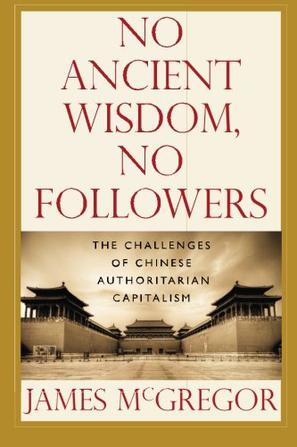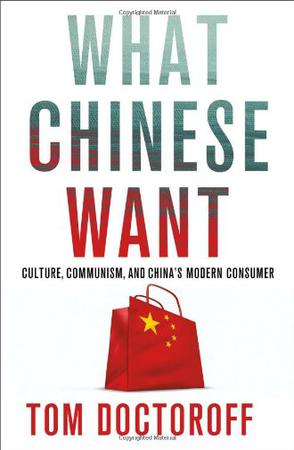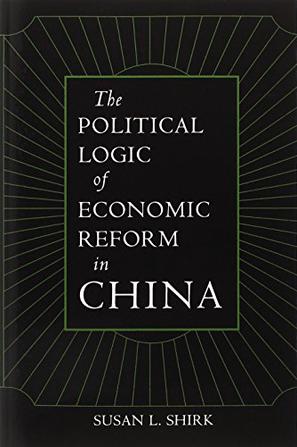-

NO ANCIENT WISDOM, NO FOLLOWERS
In the past three decades, China has risen from near collapse to a powerhouse -- upending nearly every convention on the world stage, whether policy or business. China is now the globe’s second largest economy, second largest exporter, a manufacturing machine that has lifted 500 million of its citizens from poverty while producing more than one million US dollar millionaires. Then why do China’s leaders describe the nation’s economic model as “unstable and unsustainable”? Because it is. James McGregor has spent 25 years in China as a businessman, journalist and author. In this, his latest highly readable book, he offers extensive new research that pulls back the curtain on China’s economic power. He describes the much-vaunted “China Model” as one of authoritarian capitalism, a unique system that, in its own way, is terminating itself. It is proving incompatible with global trade and business governance. It is threatening multinationals, which fear losing their business secrets and technology to China’s mammoth state-owned enterprises. It is fielding those SOEs – China’s “national champions” -- into a global order angered by heavily subsidized state capitalism. And it is relying on an outdated investment and export model that’s running out of steam. What has worked in the past, won’t work in the future. The China Model must be radically overhauled if the country hopes to continue its march toward prosperity. The nation must consume more of what it makes. It must learn to innovate. It must unleash private enterprise. And the Communist Party bosses? They must cede their pervasive and smothering hold on economic power to foster the growth, and thus social stability, that they can’t survive without. Government must step back, the state-owned economy must be brought to heel, and opportunity must be freed. During the Tang Dynasty, an official in the imperial court observed: “No ancient wisdom, no followers.” He was lamenting that regime was headed alone into dangerous and uncharted waters without any precedent for guidance. Again today – as McGregor makes clear – this is China’s greatest challenge. -

What Chinese Want
Today China is a critical player in the global marketplace, but there is still widespread confusion about what really makes the country tick - even the Chinese have difficulty explaining their own "Chineseness" to outsiders. In What Chinese Want, China expert Tom Doctoroff posits that China’s distinguishing traits explain the country in profound ways, including: *Connection to History: For thousands of years, the impulses and conflicts within Chinese civilization have driven its people’s behavior and choices. More than any other nationality, they are driven by their past history as much as by their intense focus on the future. This manifests itself in a profound belief in their country's stability and an intense national pride that often drives business decisions. *A Complex View of Morality: As evidenced by their sticky human rights issues, rampant piracy, and endemic government corruption, the Chinese have a significantly higher tolerance for certain things the West would consider wrong. Doctoroff puts these differences in context so that the reader can understand their nuances and impact on business and international relations. *Family Over the Individual: Whereas in America the individual is a prized source of originality, freewill, and consumer choice, in China the focus is squarely on the family and the larger society. This difference can be seen in the educational system, entrepreneurial activity, and many other key aspects of Chinese society.From the new generation’s embrace of Christmas to the secrecy of industry titans; from the government’s meticulously incremental approach to currency appreciation to the middle class’s fixation with luxury brands, Doctoroff explains the mysteries of modern China for those looking to enter the market in a culturally sensitive and effective way. -

The Political Logic of Economic Reform in China
Over the past decade, China managed to carry out economic reform without political reform while the Soviet Union attempted the opposite strategy. How did China succeed at economic market reform without changing communist rules? Susan Shirk shows that Chinese communsit political institutions are more flexible and less centralized than their Soviet counterparts were. Shirk pioneers a rational choice institutional approache to analyze policy-making in a authoritarian country. She offers an original theoretical framework to make sense of the history of Chinese market reform from 1979 to the present. Drawing upon extensive interviews with high-level Chinese officials, she pieces together detailed histories of economic reform policy-making and shows how the poltiical logic of Chinese communist institutions shaped those decisions. Communist politicians at different levels of the system embraced particularistic economic reform policies that enabled them to claim credit and enhance their careers. Combining theoretical ambition with the flavor of on-the-ground policy-making in Beijing, Shirk makes a major contribution to the study of reform in China and other communist countries.